News

Lakshman Balasuriya - simply a top-class human being
It is with deep sorrow that I share the passing of one of my dearests and most trusted friends of many years, Lakshman Balasuriya. He left us on Sunday morning, and with him went a part of my own life. The emptiness he leaves behind is immense, and I struggle to find words that can carry its weight.
Lakshman was not simply a friend. He was a brother to me. We shared a bond built on mutual respect, quiet understanding, and unwavering trust. These things are rare in life, and for that reason they are precious beyond measure. I try to remind myself that I was privileged to spend the final hours of his life with him, but even that thought cannot soften the ache of his sudden and significant absence.
Not too long ago, our families were on holiday together. Lakshman and Janine returned to Sri Lanka early. The rest of the holiday felt a bit empty without Lakshman's daily presence. I cannot fathom how different life itself will be from now on.
He was gentle and a giant in every sense of the word. A deeply civilised man, refined in taste, gracious in manner, and extraordinarily humble. His humility was second to none, and yet it was never a weakness. It was strength, expressed through kindness, warmth, and dignity. He carried himself with quiet class and had a way of making everyone around him feel at ease.
Lakshman had a very dry, almost deadpan, sense of humor. It was the kind of humor that would catch you off guard, delivered with too straight a face to be certain he was joking, but it could lighten the darkest of conversations. He had a disdain for negativity of any kind. He preferred to look forward, to see possibilities rather than obstacles.
He was exceptionally meticulous and had a particular gift for identifying talent. Once he hired someone, he made sure they were cared for in unimaginable ways. He provided every resource needed for success, and then, with complete trust, granted them independence and autonomy. His staff were not simply employees to him. They were family. He took immense pride in them, and his forward-thinking optimism created an environment of extraordinary positivity and a passion to deliver results and do the right thing.
Lakshman was also a proud family man. He spoke often, and with great pride, about his children, grandchildren, nephews, and nieces. His joy in their achievements was boundless. He was a proud father, grandfather, and uncle, and his devotion to his family reflected the same loyalty he extended to his colleagues and friends.

Whether it was family, staff, or anyone he deemed deserving, Lakshman stood by them unconditionally in times of crisis. He would not let go until victory was secured. That was his way. He was a uniquely kind soul through and through.
Our bond was close. Whenever I arrived in Sri Lanka, it became an unspoken ritual that we would meet at least twice. The first would be on the day of my arrival, and then again on the day I left. It was our custom, and one I cherished deeply. We met regularly, and we spoke almost daily. He was simply a top-class human being. We were friends. We were brothers. His passing has devastated me.
Today I understood fully the true meaning of the phrase 'priyehi vippayogo dukkho' -- (ප්රියෙහි විප්පයෝගෝ දුක්ඛෝ) 'separation from those who are beloved is sorrowful.'
My thoughts and prayers are with Janine, Amanthi, and Keshav during this time of profound loss. Lakshman leaves behind indelible memories, as well as a legacy of decency, loyalty, and quiet strength. All of us who were fortunate to know him will hold that legacy close to our hearts.
If Lakshman’s life could leave us with just one lesson, that lesson would be this. True greatness is not measured in titles or possessions, but in the way one treats others: with humility, with loyalty, with kindness that does not falter in times of crisis. Lakshman showed us that to stand by someone, to believe in them, and to lift them up when they falter, is the highest of callings, and it was a calling he never failed to honour.
Rest well, my dear friend.
 by Krishantha Prasad Cooray
by Krishantha Prasad Cooray
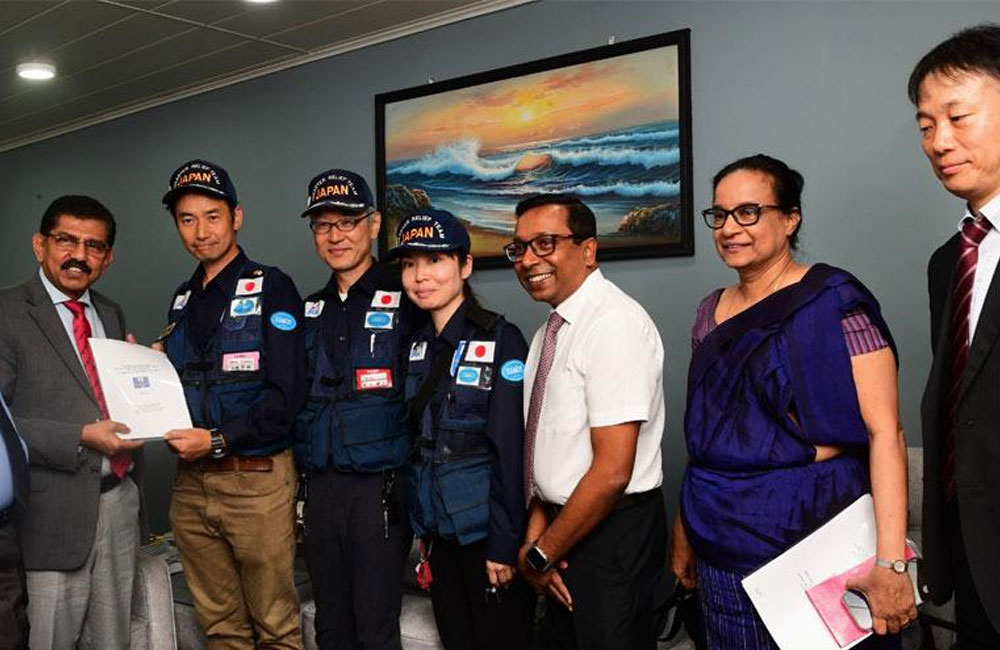
Japan Pledges US$2.5 Million in Emergency Aid for Cyclone-Hit Sri Lanka
The Government of Japan has approved an emergency assistance package worth US$2.5 million to help Sri Lanka respond to the humanitarian impact of Cyclone Ditwah, Japanese officials announced on Tuesday.The funding will be channelled through three international agencies—the International Organization for Migration (IOM), the World Food Programme (WFP) and the United Nations Children’s Fund (UNICEF)—with a focus on meeting immediate needs, including food aid, emergency shelter and essential non-food items.
Under the allocation, US$1 million will be provided to IOM to support emergency shelter and the distribution of non-food relief items. Another US$1 million will go to WFP to strengthen food assistance for affected communities, while UNICEF will receive US$500,000 to deliver water, sanitation and hygiene services, along with child protection support.Japan also announced plans to extend additional assistance through the Japan Platform (JPF), a framework that coordinates emergency humanitarian responses involving non-governmental organizations, the private sector and the Japanese government. Meanwhile, a team from the Japan International Cooperation Agency (JICA) has begun a needs assessment to guide future recovery and reconstruction initiatives.
Reaffirming its longstanding ties with Sri Lanka, Japan said it remains committed to supporting the country during this difficult period and will continue to assist efforts aimed at early recovery and rebuilding in areas impacted by the cyclone.
Cyclone Ditwah made landfall in Sri Lanka on November 27, following weeks of intense monsoon conditions that began in mid-November. According to official figures as of December 16, the disaster has claimed 643 lives, left 183 people missing, and affected an estimated 1.62 million people across the island.
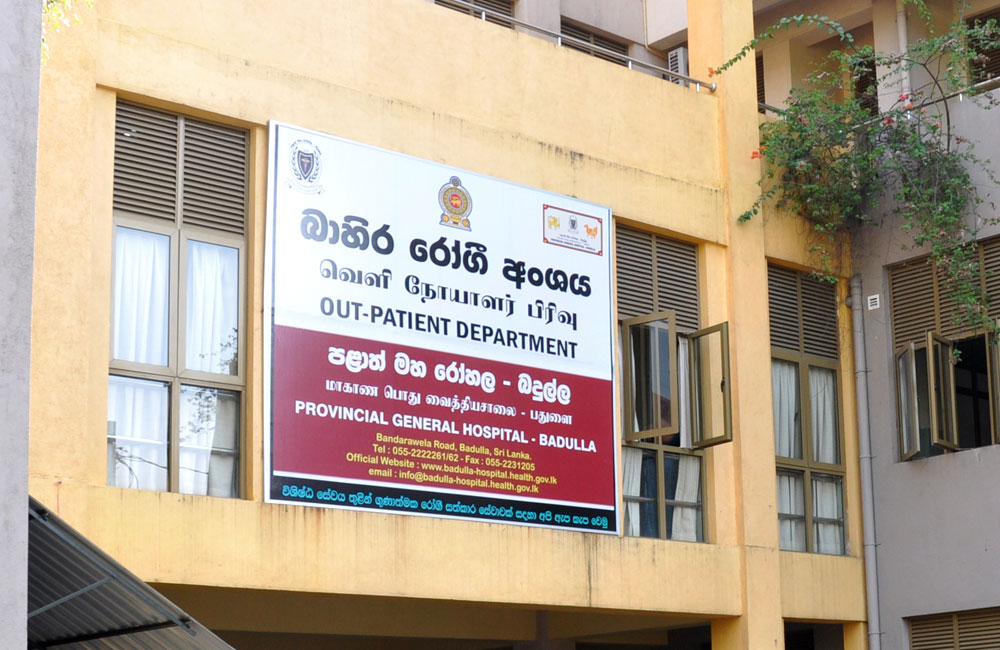
Doctors at Badulla Teaching Hospital Begin Protest After Colleague Attacked
Medical services at Badulla Teaching Hospital were disrupted today after doctors initiated a strike in response to an alleged assault on one of their colleagues.
The incident reportedly took place when a three-wheeler driver parked his vehicle behind a doctor’s car within the hospital premises. When the doctor asked the driver to move the three-wheeler, the situation escalated, leading to the doctor being physically assaulted.
The injured doctor was admitted to Badulla Teaching Hospital for treatment following the incident.
In protest over the attack and concerns about the safety of medical staff, doctors at the hospital commenced a strike action. Hospital sources indicate that the protest is expected to conclude at 4.00 p.m. today (17).
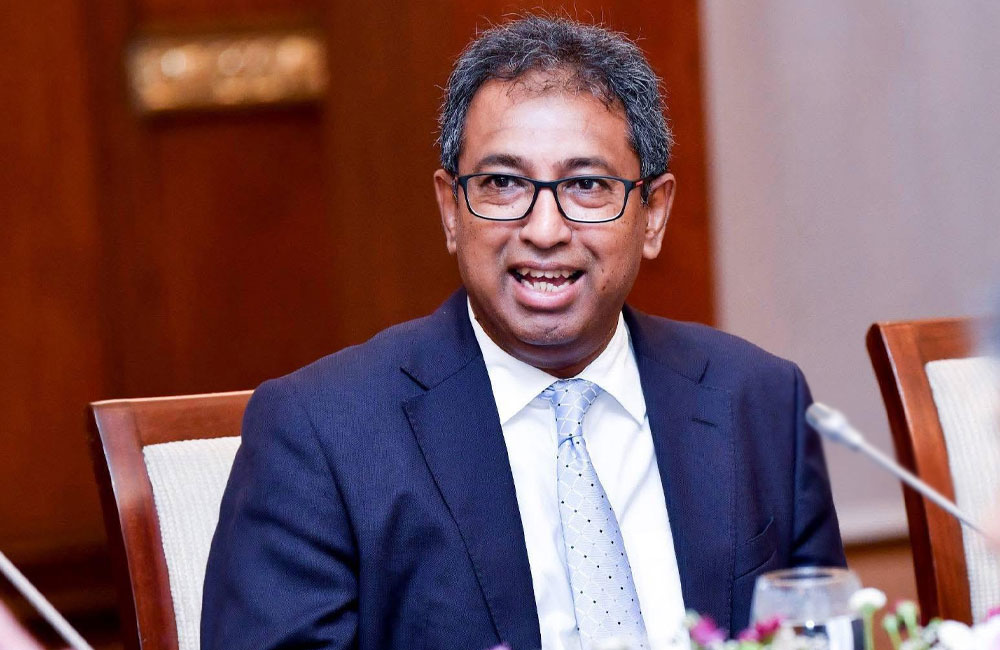
Harsha de Silva Calls for Parliamentary Approval of ‘Rebuilding Sri Lanka’ Fund
Chairman of the Committee on Public Finance, Parliamentarian Dr. Harsha de Silva, has reiterated that the proposed ‘Rebuilding Sri Lanka’ Fund must be formally approved by Parliament and established as a statutory fund.
Speaking on the matter, Dr. de Silva emphasized that any such fund requires a proper legal framework and cannot be created informally. He pointed out that similar initiatives in the past lacked parliamentary approval and said the same approach should not be repeated. According to him, the ‘Rebuilding Sri Lanka’ Fund should be brought before Parliament and approved without delay.
He further stressed the importance of transparency in managing the fund, noting that the responsibility of rebuilding should not rest solely with the government. Dr. de Silva said there is room for meaningful participation from the private sector, with the government focusing on areas that cannot be addressed privately.Meanwhile, the MP said a supplementary estimate of Rs. 500 billion should be presented to Parliament to support recovery efforts, adding that the government has adequate financial resources to meet this requirement.
Dr. de Silva explained that Rs. 1,400 billion has already been allocated for capital expenditure next year, including infrastructure projects such as roads and hospitals. He noted that funds could be reallocated from these provisions due to the damage caused by the recent cyclone, arguing that new sources of funding may not be necessary. However, he said additional expenditure would be required for immediate needs such as cleaning and rehabilitation activities, which he described as manageable.He also observed that while the IMF programme places a cap on primary expenditure at 13 percent, the current crisis allows for some flexibility. In addition, he noted that the government holds more than one trillion rupees within the banking system, providing further financial space to respond to the situation.
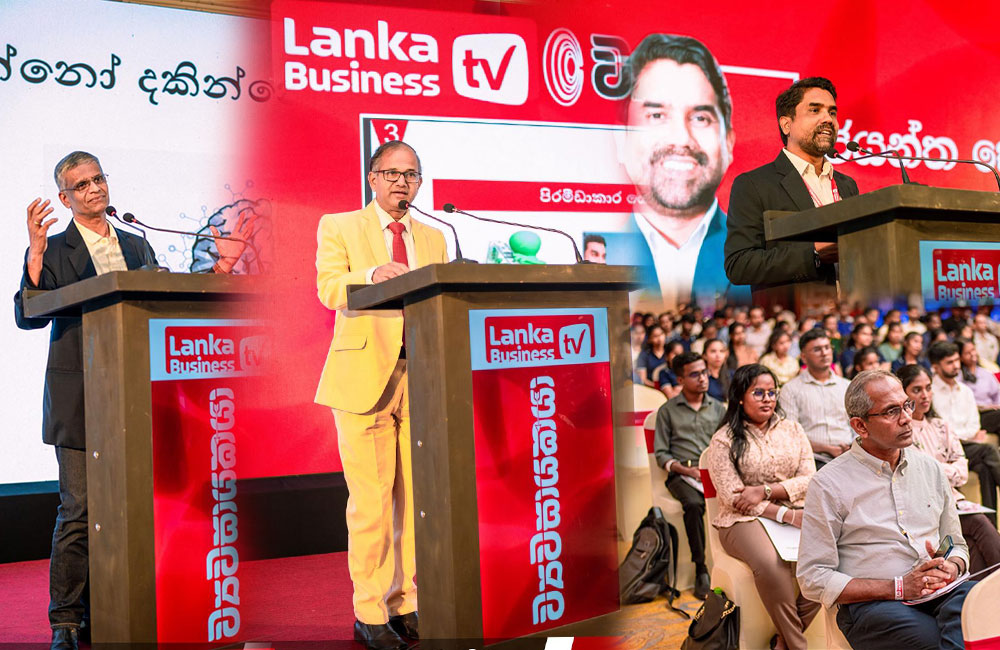
Lanka Business TV’s “Vyavasayakaya” Business and Investment Summit in Gampaha Draws Overwhelming Response
Lanka Business TV, in collaboration with Lankadeepa FT, successfully hosted its highly acclaimed “Vyavasayakaya” (The Entrepreneur) Business and Investment Summit in Gampaha, drawing an impressive crowd of over 250 participants, including entrepreneurs and individuals keen to enhance their economic and investment knowledge.
The summit was held at The Glasgow Hotel in Kalagedihena, following a brief postponement due to flood risks in the area. Despite the delay, the strong turnout underscored the growing public interest in entrepreneurship-focused knowledge-sharing platforms, according to Lanka Business TV Founder and Chief Executive Officer, Mr. Jayantha Kovilagodage.
“The significant participation despite the rescheduling clearly demonstrates the demand for such programmes among the public,” Mr. Kovilagodage said.
The keynote address was delivered by renowned management consultant Mr. Deepal Sooriyaarachchi, who shared strategic insights on entrepreneurship and business growth. The summit also featured expert presentations from a distinguished panel of speakers, including:
-
Mr. Ruwan Perera, Chief Executive Officer, NDB Wealth Management
-
Mr. Chalinda Abeykoon, Managing Partner, nVentures
-
Mr. Inoke Perera, Sector Head, John Keells Properties
-
Mr. N.A. Aruna Wijesiri, Deputy Director, Central Bank of Sri Lanka
Participants were also treated to an interactive experience, with opportunities to win attractive prizes. One fortunate attendee won a round-trip air ticket to Malaysia.
Lanka Business TV announced that it is currently planning four additional “Vyavasayakaya” Business and Investment Summits for 2026, as part of its continued efforts to promote entrepreneurial education across the country.
The “Vyavasayakaya” series has already been successfully conducted in Gampaha, Kurunegala, Matara, Kandy, and Ratnapura, further cementing its reputation as one of Sri Lanka’s leading regional business knowledge platforms.


Heavy Rains and Strong Winds Forecast as Easterly Wave Persists
Showery weather is set to persist over large parts of the country over the next few days due to the continued influence of an Easterly wave, the Department of Meteorology said.
Rain is expected at intervals in the Northern, North-Central, Eastern, Uva and Central provinces. Very heavy rainfall exceeding 100 millimetres is likely in certain locations in the Eastern and Central provinces, as well as in the Badulla and Polonnaruwa districts.
In other regions, showers or thundershowers may develop at several places after 1.00 p.m., with fairly heavy rainfall of more than 75 millimetres possible in some areas.
Strong winds, reaching speeds of around 40 to 50 kilometres per hour, are also anticipated at times, particularly along the eastern slopes of the central hills, in the Northern, North-Central and North-Western provinces, and in parts of Trincomalee, Hambantota and Monaragala districts.Misty conditions are expected during the early morning hours in parts of the Sabaragamuwa and Central provinces, as well as in the Galle and Matara districts.
The public has been advised to take necessary precautions to reduce potential damage caused by sudden strong winds and lightning associated with thundershowers.

Digitising Justice: Promise or Partial Fix for Court Delays?
Sri Lanka’s long-delayed judicial reforms have once again come into focus with the Cabinet of Ministers approving the implementation of the e-Court Project, a flagship initiative aimed at digitising the country’s judicial system. The Cabinet has sanctioned Rs. 150 million from allocations under the Clean Sri Lanka Project to be channelled to the Judicial Service Commission (JSC), signalling political backing for what the government describes as a national priority.
The initiative follows the launch of a dedicated Supreme Court website and an electronic Case Management System (e-CMS) during the first phase of judicial digitalisation. Authorities now plan to replicate this model across all courts islandwide, including the Court of Appeal, the JSC, and the Institute of Judges, eventually creating a national judicial data network.
According to Cabinet Spokesman Dr. Nalinda Jayatissa, the digital overhaul is expected to address chronic problems such as case backlogs, lack of transparency, procedural inefficiencies, and prolonged delays that have eroded public confidence in the justice system. The project also aligns with the IMF Reform Agenda 2026–2030 Public Investment Programme and the broader Clean Sri Lanka Strategy.
Justice Ministry sources say Sri Lanka is exploring paperless court operations as a remedy for excessive delays that often force litigants to travel long distances merely to learn the next hearing date. Under the proposed e-Court system, judges, lawyers and litigants would be able to file documents electronically, submit evidence digitally and, in certain circumstances, participate in hearings remotely.
An e-Court is defined as a court environment supported by advanced technical infrastructure, allowing administrative and procedural functions to be carried out electronically. Features such as electronic filing, digital record-keeping, and remote testimony are expected to reduce inefficiencies while improving access to justice.
A senior telecommunications expert with extensive national and international experience noted that e-Court services could modernise judicial administration in line with global technological standards.
He further argued that the involvement of lay judges through digital platforms could help create a multidisciplinary knowledge base, supporting more transparent and higher-quality judicial outcomes.
Justice Ministry officials also highlight the potential of e-Court services to reduce unproductive commuting, especially in traffic-congested urban centres. Many litigants currently attend court simply to be informed of new dates, a practice the digital system seeks to eliminate.
However, the scale of the challenge remains significant. Attorney General’s Department sources reveal that a large number of cases remain unresolved, while the overall backlog stands at thosands of cases, including over 100 highly controversial matters.
While special courts have been tasked with fast-tracking hearings, observers caution that without comprehensive implementation, adequate training, and system-wide accountability, digitisation alone may not deliver the justice revolution being promised

Cabinet Clears International University Partnerships to Boost Research and Academic Exchange
The Cabinet of Ministers has given the green light to a series of Memoranda of Understanding (MoUs) between leading Sri Lankan universities and foreign academic institutions, aimed at strengthening international cooperation in higher education and research.
The approvals cover partnerships involving the University of Peradeniya, the University of Kelaniya, and the University of Vavuniya with institutions in China, Japan, and India. These agreements focus on areas such as climate change, environmental pollution, antimicrobial resistance, informatics, and the exchange of students and academic staff.
Among the approved agreements is a project partnership between the University of Peradeniya and the Alliance of National and International Science Organizations for the Belt and Road Regions (ANSO) to jointly organise the International Water Summit on climate change and environmental pollution.
The Cabinet has also endorsed a research collaboration and material transfer agreement between the University of Peradeniya and the Chinese University of Hong Kong. This initiative will focus on studying the transmission of Methicillin-Resistant Staphylococcus Aureus (MRSA) across humans, animals, and the environment, including research into antimicrobial resistance and genetic diversity.
In addition, approval has been granted for an MoU between the University of Kelaniya and Japan’s Kyoto College of Graduate Studies for Informatics (KCGI). The partnership seeks to expand educational cooperation, promote professional and cultural exchanges, and facilitate joint research projects, conferences, and workshops.
The University of Vavuniya will also enter into an MoU with the Indian Institute of Technology Madras (IIT Madras) to develop collaborative education and research initiatives, enable the exchange of academic resources, facilitate staff and student mobility, and organise joint academic events. Furthermore, an agreement between the University of Vavuniya and the Indian Council for Cultural Relations has been approved to secure visiting lecturers on a contractual basis.
These approvals were granted following a proposal submitted by Prime Minister Harini Amarasuriya in her capacity as Minister of Education, Higher Education, and Professional Education, underscoring the government’s commitment to expanding Sri Lanka’s global academic engagement.
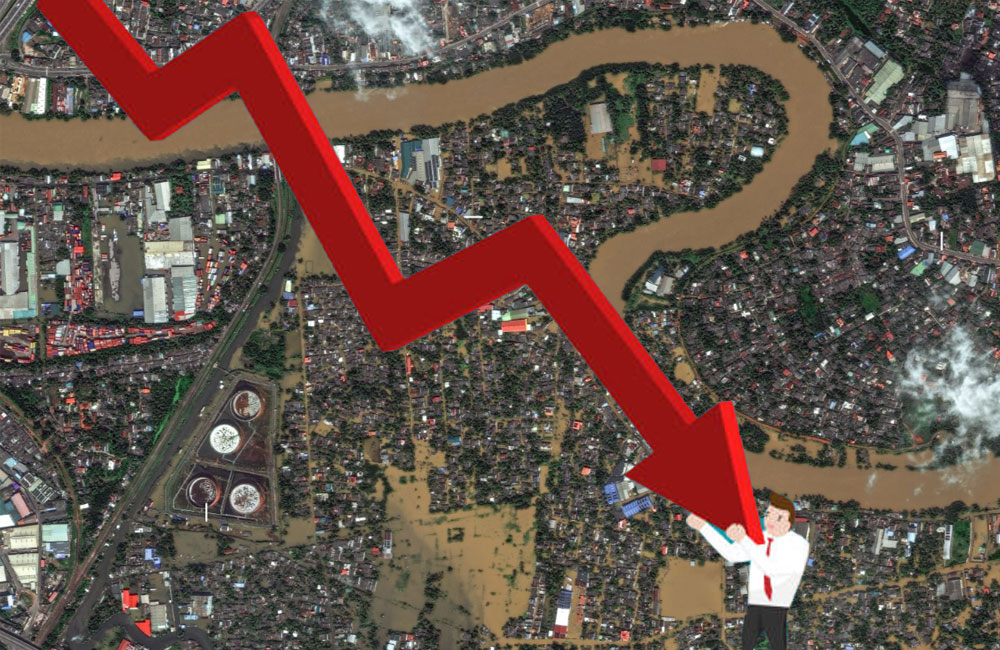
Sri Lanka Disaster Governance Overhaul Slows Recovery Efforts
The Government’s renewed focus on disaster governance, showcased at the 16th meeting of the National Council for Disaster Management chaired by President Anura Kumara Dissanayake, signals an ambitious attempt to overhaul Sri Lanka’s disaster response framework.
However, while policy reforms and institutional restructuring dominate the agenda, mounting evidence suggests that these initiatives may unintentionally delay urgent reconstruction and livelihood recovery for millions affected by Cyclone Ditwah.
At the heart of the meeting was a Cabinet Memorandum proposing a National Integrated Disaster Management Mechanism alongside amendments to the Sri Lanka Disaster Management Act of 2005.
In principle, these reforms aim to strengthen coordination, transparency, and long-term resilience. In practice, however, critics warn that layering new mechanisms onto an already overstretched system risks slowing immediate action when speed is critical.
The scale of devastation underscores the urgency. According to the Disaster Management Centre, approximately 2.2 million people were affected islandwide, with more than 6,000 houses completely destroyed and over 112,000 partially damaged.
Nearly 73,000 people remain in temporary shelters weeks after the cyclone, highlighting gaps between policy intent and ground-level delivery.
Several new initiatives announced at the meeting including a Central Fragile Area Management Plan, multi-stakeholder landslide risk mitigation in plantation regions, and a unified digital data-sharing platform are technically sound but administratively complex.
Each requires the formation of committees, consolidation of data across institutions, and the establishment of new certification and legal frameworks. Disaster experts caution that these processes, while necessary for long-term planning, could further delay reconstruction approvals, resettlement decisions, and livelihood restoration.
The President’s directive to identify 15,000 houses in high-risk zones and construct 8,000 new homes by end-2026 reflects a commitment to durable solutions. But affected communities argue that immediate transitional housing, faster compensation payments, and simplified approval procedures are more pressing needs.
Even the Rs. 25,000 cleaning allowance for flood-affected households has faced disbursement delays, prompting direct presidential intervention to clear payments within a week.
Transparency reforms, including the establishment of a Foreign Aid Coordination Committee, aim to restore donor confidence. However, the timing raises concerns. Sri Lanka’s past experiences show that excessive procedural checks during emergencies often deter timely inflows of foreign assistance and slow deployment to affected areas.
Historical lessons were also revisited. The Finance Ministry revealed that the 2016 flood insurance scheme resulted in a net loss of Rs. 5.79 billion to the State due to weak reinsurance coverage. While reforming such schemes is prudent, delaying decisions until “expert advice” is finalised risks leaving vulnerable communities exposed in the interim.
Unless policy decisions are expedited and emergency exceptions applied, Sri Lanka’s disaster reforms may remain strong on paper while survivors continue to wait.

Australian Prime Minister visits Bondi hero Ahmed al-Ahmed in Sydney hospital
The man who tackled one of the Bondi shooters has spoken from hospital as he recovers from his injuries and has been visited by Australian Prime Minister Anthony Albanese, who praised him as “the best of our country”.
Ahmed al-Ahmed, 43, risked his life to disarm one of the alleged Bondi attackers and save multiple lives in Sydney on Sunday evening.
Turkey’s public broadcaster, TRT World, on Tuesday posted a video of Ahmed being wheeled around hospital while he sent prayers to supporters.
“I appreciate the efforts of everyone,” he said in Arabic.
“May Allah reward you and grant you wellbeing. God willing, we will return to you with joy. Thank you for your efforts.
“I went through a very difficult phase, only Allah knows it … I ask my mother, the apple of my eye, to pray for me.”
The governor general, Sam Mostyn, visited the Syrian-born shopkeeper on Tuesday afternoon at St George hospital in Sydney’s south, where he had undergone surgery on two gunshot wounds.
Carrying flowers picked from Admiralty House, she thanked him on behalf of the public and of King Charles, who she said had specifically asked after the man overnight.
“For Ahmed, he wants to send thanks for … that moment of absolute heroics that we’ve all been staggered by and so grateful for,” Mostyn said.
She said she expected Ahmed would receive a bravery award and that he had already been nominated “many, many times”.
The prime minister on Tuesday morning spent nearly half an hour visiting the man he described as “the best of our country”
Ahmed thanked Anthony Albanese as he lay in his hospital bed, a fluid drip and bouquets of flowers beside him, with his left harm heavily bandaged.
“Your heart is strong, your courage is inspiring,” Abbanese said, shaking Ahmed’s right hand in a video posted to Instagram.
The prime minister told reporters the man was recovering ahead of further surgery on Wednesday and explained his thought processes on Sunday evening during their conversation.
“He was trying to get a cup of coffee, simple as that, and found himself at a moment where people were being shot in front of him,” the prime minister said.
“He decided to take action and his bravery is an inspiration for all Australians. He is a very humble man.”
Albanese also met Ahmed’s mother and father in the hospital, visiting from Syria, who he said were “very proud” of their son.
The New South Wales premier, Chris Minns, visited Ahmed in hospital and spoke to him on Monday night.
The former prime minister John Howard also lauded Ahmed’s bravery, speaking to Sky News on Tuesday.
“The single act of greatest courage we’ve seen is that magnificent man who tackled the bloke with the gun, and I understand he’s a Muslim,” Howard said.
“There are good people of every persuasion in this wonderful country about and although it’s a terrible tragedy and a reminder that anything can happen here, we should not lose faith in the Australian achievement.”
A GoFundMe set up to support the man has attracted over $2m in donations, including a $99,999 donation from William Ackman, the US billionaire and founder of hedge fund Pershing Square.
( source : Newswire )
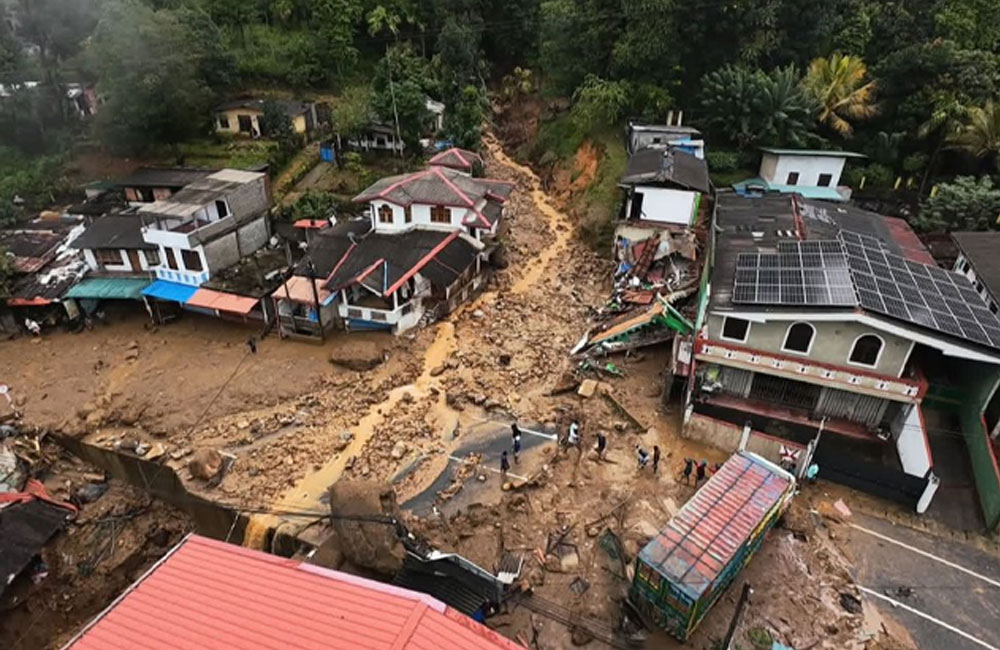
Donor Conference Hype Masks Sri Lanka’s Aid Failure
Sri Lanka’s decision to convene an international donor conference in the wake of Cyclone Ditwah is being presented by the government as a decisive diplomatic move. Yet, behind the public optimism lies a troubling gap between rhetoric and results. Nearly three weeks after the disaster, only US$170 million around 17% of the estimated US$6.5-7 billion reconstruction requirement—has been mobilised, exposing serious shortcomings in foreign engagement and crisis diplomacy.
Foreign Affairs Minister Vijitha Herath confirmed that the donor conference will be convened once a comprehensive needs assessment, currently led by the World Bank alongside government agencies, is completed.
While the procedural logic is sound, critics argue that the delay reflects a lack of urgency in a crisis that has already claimed more than 600 lives and devastated national infrastructure, including highways, irrigation networks, power transmission lines, and public buildings.
Government spokesmen have attempted to project Minister Herath as a capable international operator, even drawing implicit comparisons with the late Lakshman Kadirgamar, whose diplomatic stature helped galvanise global support after the 2004 tsunami.
Such comparisons, however, appear premature and misplaced. Kadirgamar combined global credibility, strategic communication, and bipartisan respect qualities that translated into swift and large-scale international mobilisation. By contrast, the current administration’s outreach has been fragmented and low-impact.
Although Sri Lanka has received emergency assistance from several countries—including India, the United States, China, Japan, Australia, the UK, and regional neighbours the bulk of this aid has arrived in-kind or as limited emergency funding rather than large-scale reconstruction financing. India’s early response stood out, but broader donor engagement has remained cautious, reflecting concerns about governance capacity, transparency, and policy coherence.
Domestically, the government established the Rebuilding Sri Lanka Fund, which has collected approximately Rs. 3.4 billion, largely from local donors and business figures. While commendable, this amount is negligible when measured against the scale of national losses. Internationally, the UN-led Humanitarian Priorities Plan (HPP) has sought US$35.3 million to support 658,000 vulnerable people through April 2026 again highlighting the gap between humanitarian relief and long-term reconstruction needs.
The proposed donor conference could still serve as a turning point, but only if backed by credible leadership, transparent frameworks, and clear reform commitments. Without these, the initiative risks becoming another symbolic gesture—heavy on announcements, light on outcomes—at a time when the country can least afford diplomatic underperformance.
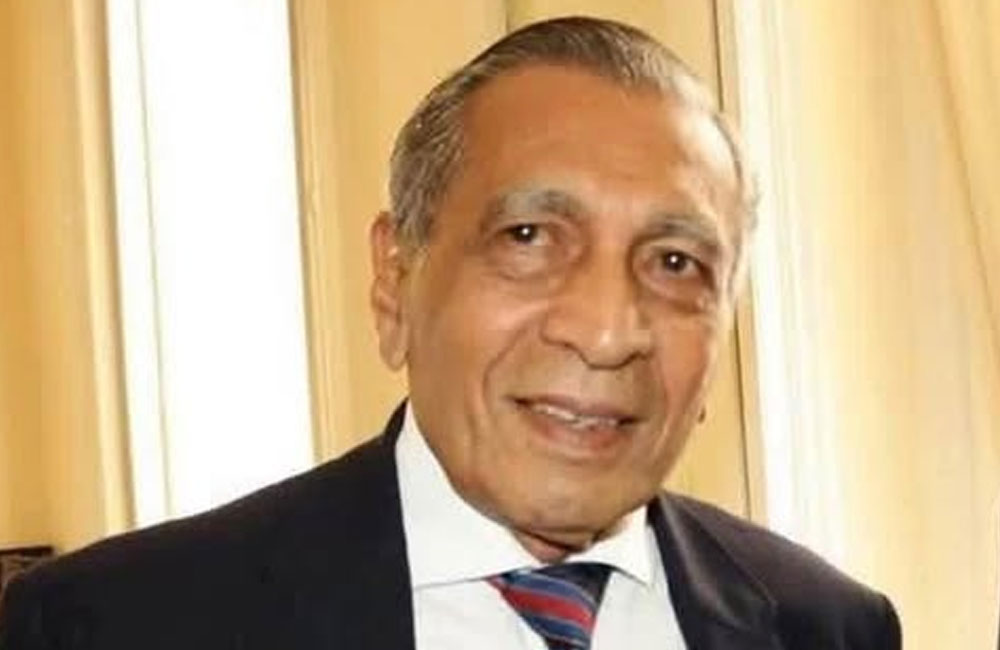
Veteran Legal Luminary and Former Envoy Daya Pelpola Dies at 85
President’s Counsel Daya Pelpola, a highly regarded figure in Sri Lanka’s legal, political, and diplomatic circles, has passed away at the age of 85.Pelpola served the United National Party for more than 15 years as its Legal Secretary and later as Acting General Secretary, where he was instrumental in strengthening the party’s organisational framework.
During the ‘Yahapalana’ administration, he was appointed Sri Lanka’s Ambassador to Italy, a post he held from 2015 to 2019. While serving overseas, he worked to deepen bilateral relations between Sri Lanka and Italy, focusing on cooperation in political, economic, cultural, and educational fields.In addition to his political and diplomatic career, Pelpola held several key positions in the public sector, including Chairman of SriLankan Airlines, the National Lotteries Board, and the Sri Lanka Insurance Corporation.
His remains are lying at his residence at No. 78, Liyanage Mawatha, Pelawatta, Battaramulla. Preliminary religious observances will take place today at 3.00 p.m. at the Pelawatta Lyon Baston Roman Catholic Church, followed by burial at the Borella Kanatte Cemetery at 4.30 p.m.
Page 31 of 660